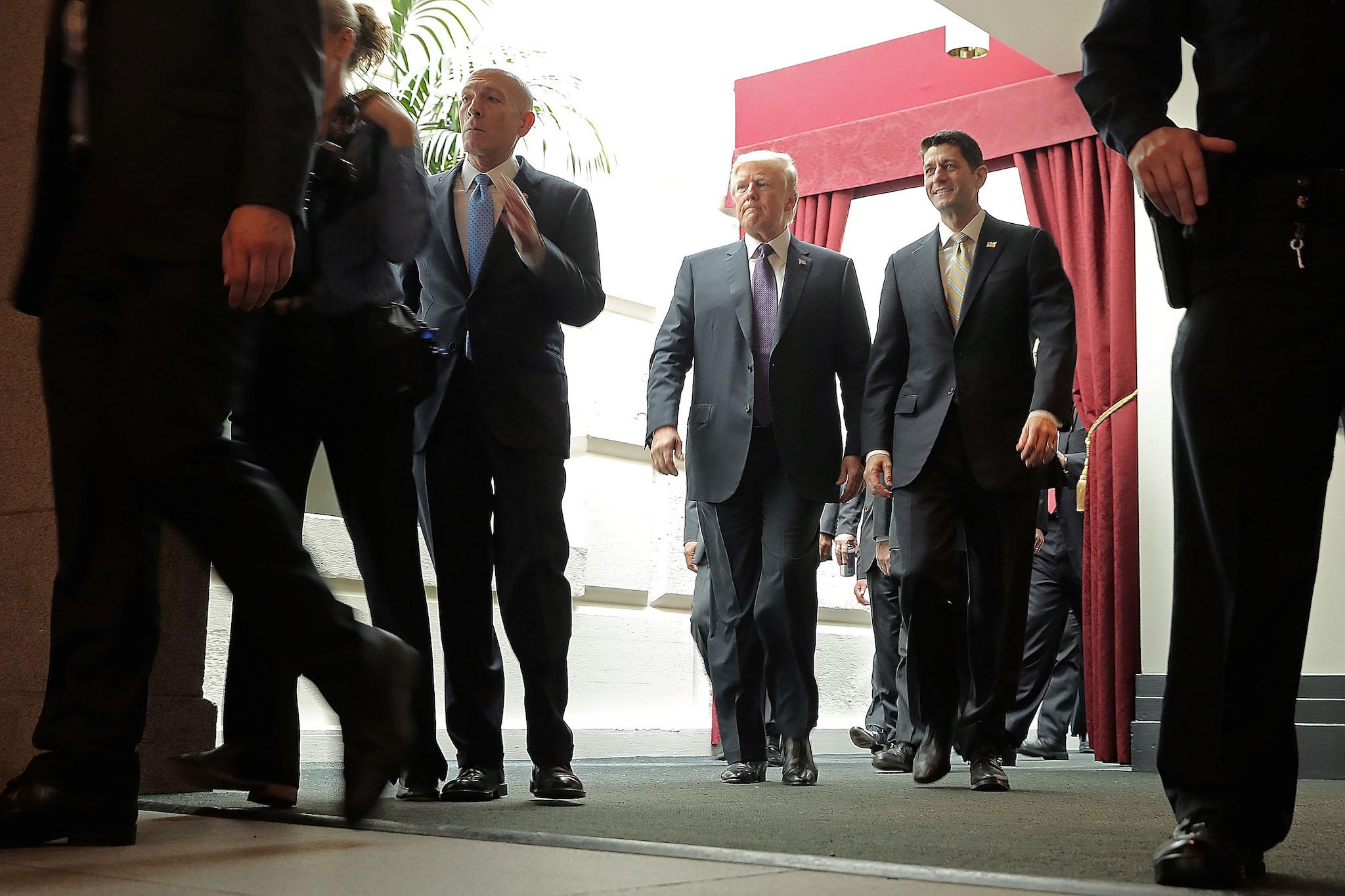House Republicans pass $1.5 trillion tax bill that would benefit Trump
Tax legislation in the Senate faces a more uncertain future

Republicans in the House of Representatives have approved a sweeping $1.5 trillion tax cut - but President Donald Trump's mission to rewrite the US tax code and lower taxes for corporations is far from complete.
While the House, in a 227-205 vote, has met the threshold it needed to pass a tax bill, tax legislation in the Senate faces a more uncertain future.
House Democrats were united in their opposition to the legislation, while only 13 Republicans voted against it.
“Passing this bill is the single biggest thing we can do to grow the economy, to restore opportunity, to help these middle-class families that are struggling,” House Speaker Paul Ryan told members of Congress.
Mr Trump travelled to the other end of Pennsylvania Avenue with Vice President Mike Pence to speak to representatives ahead of the vote.
According to Republican Representative Mark Meadows, the President was “unbelievably engaging” to a point where some Republicans who might not be voting for the tax bill today “might have second thoughts,” he told reporters.
In a statement, the White House called the passage of the measure “a big step toward fulfilling our promise to deliver historic tax cuts for the American people by the end of the year.”
“We are working together to allow hardworking, middle-class families to keep more of their money, and to empower our companies and workers to dominate their global competition,” the statement said. “A simple, fair, and competitive tax code will be rocket fuel for our economy, and it’s within our reach. Now is the time to deliver.”
Critics of the bill have said it disproportionately benefits corporations and the wealthiest Americans, including Mr Trump himself, while only providing modest gains to middle-income earners.
The measure would be estimated to increase the federal deficit by nearly $1.5 trillion over the next decade, would consolidate individual and family tax brackets to four from seven and lower the corporate tax rate from 35 per cent to 20 per cent.
It also would scale back or end some popular tax deductions, including one for state and local income taxes.
Some expert analyses have shown that millions of Americans could ultimately end up with higher taxes because of the elimination of popular deductions. Repealing or cutting some deductions is a way to offset the government revenue lost from tax cuts.
“It's a shameful piece of legislation, and the Republicans should know better,” House Democratic leader Nancy Pelosi told members of Congress before the vote.
There is an ocean of differences between the House’s bill and the Senate’s tax proposal that would need to be reconciled before a final measure could head to the President’s desk to be signed into law.
But there is question if a tax proposal could make it even that far.
Earlier this week, Senate Republicans made the already complicated issue of tax reform even more complex by throwing the political grenade of healthcare into the mix.
After having failed to dismantle Obamacare multiple times, Senate Republicans now intend to include a repeal of the law’s requirement that most people have health insurance in their tax rewrite.
Republicans have been desperate to find a way to fund their tax proposal so as not increase the budget deficit by $1.5 trillion over 10 years.
Since party members are using a legislative process known as reconciliation – meaning they can push a bill through Congress without any support from Democrats – they must keep the cost of the bill to to this amount.
Repealing the health law’s so-called individual mandate would allow Republicans to save more than $300bn over 10 years. But it would lead to 13m people losing their health insurance over the same time period and a 10 per cent increase in premiums, according to the nonpartisan Congressional Budget Office.
Republicans have said they would use the savings — which stem from reduced government spending to subsidise health coverage — to pay for an expansion of the middle-class tax cuts that members of Congress have proposed.
“For multinational corporations, their handouts are set in stone, written in ink, locked in place with the key thrown away. But not for the middle class,” Mr Wyden said during a hearing on the bill. “For middle-class families, premium increases are the same thing as tax increases.”
While eliminating the mandate may help get conservative Senate members on board with the tax bill, it may alienate others.
In July, three Republicans killed a proposal that did little more than repeal the requirement that everyone purchase insurance.
Like in his previous efforts to dismantle Obamacare, Senate Majority Leader Mitch McConnell can only afford two defections from Republicans on the tax bill. All 48 Democrats in the 100-member Senate are expected to oppose it.
Republican Senator Ron Johnson already said he won't vote for the proposal, saying it unfairly benefits corporations more than other types of businesses.
Join our commenting forum
Join thought-provoking conversations, follow other Independent readers and see their replies
Comments
Bookmark popover
Removed from bookmarks